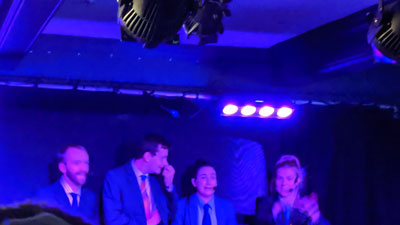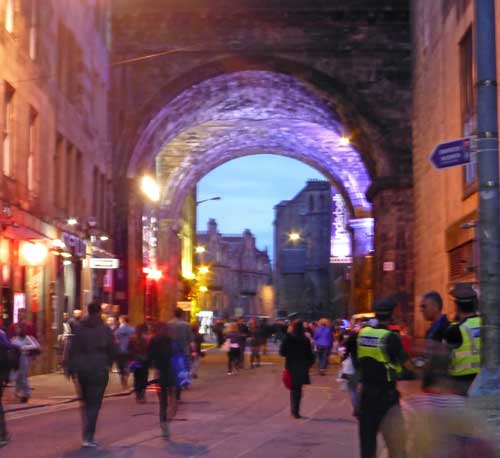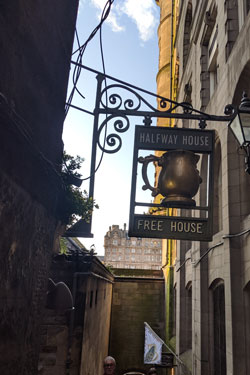A round-up the rest of the performers I saw in my intensive two days in Edinburgh — highlighting the aspects of comedy that appeared to be strongest in each.

Performance
I saw the sketch show by Just These Please at the Gilded Balloon Teviot during a convenient and relatively clash-free lunchtime. It was a four-handed, fast-paced show of the type I’ve seen recorded in the BBC Radio Theatre several times — except this bunch performed without scripts in their hands and no leeway to corpse and fill in with retakes at the end. So credit to them all for performing the show so seamlessly. I thought their darker material (shades of dark, given the performance time!) was more promising — especially the polite middle-class people meeting dog walking after anonymous encounters at suburban orgies (although it was interesting material to present before one o’clock in the afternoon).
I don’t know much about the backgrounds of the four performers but they seemed all terribly well-spoken and reminded me slightly of the Footlights College team in the University Challenge episode of The Young Ones (stellar company as that included Emma Thompson, Stephen Fry, Hugh Laurie and, er, Ben Elton).
I was puzzled over why their signature team look appeared to be over-sized lounge suits. Perhaps there’s an elaborate double bluff going on — “people think we’re rather posh so we’ll try to get in on the joke and be ironic by sartorially portraying ourselves as knowingly twee”. I’d like to think it’s a tribute to the great leader of ill-fitting, suit-wearing comedians, Alexei Sayle in his prime, but somehow I don’t see the two acts comfortably co-existing.
Nevertheless, there’s a very limited amount of busking and improvising that can be fallen back on in a collective show like this so these four really had to know their material inside-out and appeared to pull it off with ease.
Narrative
Maisie Adam is an easeful performer with a charming, Yorkshire persona — and not necessarily from straight-down-the-pit. As she points out, middle-class people are known to exist in Yorkshire. (Perhaps Waitrose has even made it there.) In the early part of the show she kept the audience entertained with a mixture of anecdotes about her upbringing and framed this around a loose theme of people getting caught for transgressing (Hugh Grant and Mick Jagger’s mug shots were on a washing line) and then partially redeeming themselves by being honest and owning their shame, rather than persisting with the lie. She made allusions to the current bunch of disgracefully shameless liars occupying both 10 Downing Street and the White House and it seemed a cop-out at the time, it appeared she was too nervous of compromising her scatty persona to press that obvious conclusion home. It almost felt immoral that she didn’t.
At this point, with the set apparently swerving direction and missing targets that appeared to have been set up, it became clear that Adam was preparing the audience for a big narrative reveal — the kind of twist that makes the earlier references and their arrested development much more explicable. Another interesting dead end (perhaps well avoided) was when she mentioned a case where two parents had left their children briefly unattended on a foreign holiday (and, no, it wasn’t that one).
And then about three-quarters of the way through the set (at the point where the third act would begin in a classical narrative arc) she made a big, personal reveal. It wouldn’t be fair to describe the twist any further but it put the previous forty-five minutes into clear context. This was a comedian structuring her hour meticulously — a far cry from one-line joke tellers — and obviously revelling in her freedom from the constraints of five or ten minute slots.

Cultural References and Incongruity
Olga Koch‘s background has given her a well-stuffed repository of cultural references to mine for her sets. She was born in Russia (and has a Russian family), she was educated in the US and has lived and is now presumably based in the UK. Much of the set was composed of humorous cultural contrasts, such as traditional Russian attitudes to women.
She’s also unusual in that she studied computer programming at college — a speciality that shouldn’t (and didn’t used to) seem unusual for a young woman but she found herself very much in the minority among stereotypical male computer nerds.
The theme of her set was loosely based around the binary concepts found in computer science — particularly the if/then conditional operator where the logic can only proceed in one of two ways depending on whether a condition is true or false.
It’s a profound concept — perhaps not that easy to explain to a comedy audience expecting jokes but one that actually does underlie the way much comedy actually works. Often jokes are structured around contradictions, especially when there’s a sudden switch between two mutually exclusive interpretations (“A man walks into a bar. Ow! It was an iron bar.”).
The if/then construct also represents the point at which hard decisions need to be taken. It’s the opposite of the idea of having your cake and eating it. It’s where the Orwellian concept of maintaining two fundamentally incompatible beliefs hits the natural laws of logic. Again, this principle underlines much comedy — often satire where the laughs are generated by the audience’s awareness that the hypocrisy, lies and double-standards of the subject (take a certain newly undemocratically installed prime-minister for instance) mean that what’s being said is the opposite of what’s truly believed. But it also applies to basics like the banana skin (man walks towards banana skin, we know he’s going towards it, the humour is that we know it’s impossible to have two incompatible states in which he both steps on the skin and stays upright, at the moment of the slip he switches condition as in an if/then statement and it’s the irrevocability of this that’s amusing).
But fortunately for the audience, Olga didn’t go into any of this analytical stuff in great detail. She just concentrated on being funny.

Working the Audience
By logistical chance I was one of the first to line up for Joanne McNally‘s show, The Prosecco Express. (Being an Edinburgh newbie meant I didn’t realise that the Assembly Studios were actually re-purposed university lecture rooms and that the consequent layout means that the queues were in different places to the rooms.)
Being one of the first to be admitted, I had that terrible dilemma of entering any empty auditorium without an allocated seat-plan but particularly so for stand-up comedy. Do I dare go and sit at the front? This question was made all the more difficult as Joanne McNally was already on the stage ad-libbing comments about the entering audience. In the end I decided to be brave and sat at the front, although not in the centre.
There’s an interesting dynamic with comedy audiences — with most of the audience members quite fearful of “being embarassed” by being “picked-on” by the comedian on stage. There’s an interesting contradiction if the same people are asked whether they’d ever try their hand at stand-up. Apart from the initial terror of public speaking, most people say they’d be terrified of being heckled.
For some people these fears tend to dissipate with experience — it’s said that budding stand-ups need to get the experience of dozens of gigs under their belts in which they don’t get heckled to develop the confidence to deal with infrequent occurrences. There’s also a type of regular audience member who enjoys (and comes to expect) some interaction with the comedian. It’s part of the skill of the MC to read an audience, identify those who want to join in and also (and this is crucial for the enjoyment of everyone else) to frame the exchanges in the form of simple (yes/no) or predictable answer questions to which a prepared or improvised response can be given that emphasises who has the upper hand in the situation. (The MC also performs a vital function in identifying suitable targets for the other acts on the bill, who’ll often stand at the back assiduously taking notes.)
The more subtly this can be achieved the better — but in the end there’s a reason why a stand-up comedian is invariably given a microphone, is brightly lit and (usually) elevated above the audience, even in a small room. It’s because the billed comedian is the person in control — the one the audience has given its prior consent to be entertained by. If it turns into a free-for-all then why not save the admission fee and go down to the nearest Wetherspoons in the evening where there’s probably no shortage of unfunny loudmouths waiting to share their obnoxious views?
Joanne McNally worked her audience well. I can understand why she chose to watch them file in — subtly performing her own MC intelligence gathering. In the end I was glad I sat on the front row. I was put on the spot a couple of times, gamely offering up responses that were neither outrageously embarrassing nor cringeing with the attention (so she concentrated on more productive targets). At various points she stepped off the (admittedly low) stage to stand right up against the front row and I was able to observe how she used her presence to manage the audience — facial expressions, gestures, body posture.
She’s a confident performer — she’s regularly on the telly in Ireland — and her interrogative style mostly worked well for her material. This centred around confessional themes of relationships, sex and friends embarking on different life-stages that the title suggested might be up for discussion after a bottle of two of prosecco. I thought she was straying into potentially risky territory with a couple of the questions she fired at the audience (one related to partner’s genitals) and she did seem momentarily floored when an audience member shot back a reference to some of her own most risque subject material when asked a question later.
I also was a little disappointed that the subject of prosecco itself was manifested in little more than a flute of the fizzy stuff as a prop which was mostly untouched during the show. But I guess she was enjoying her engagement with the audience too much to worry about that.
